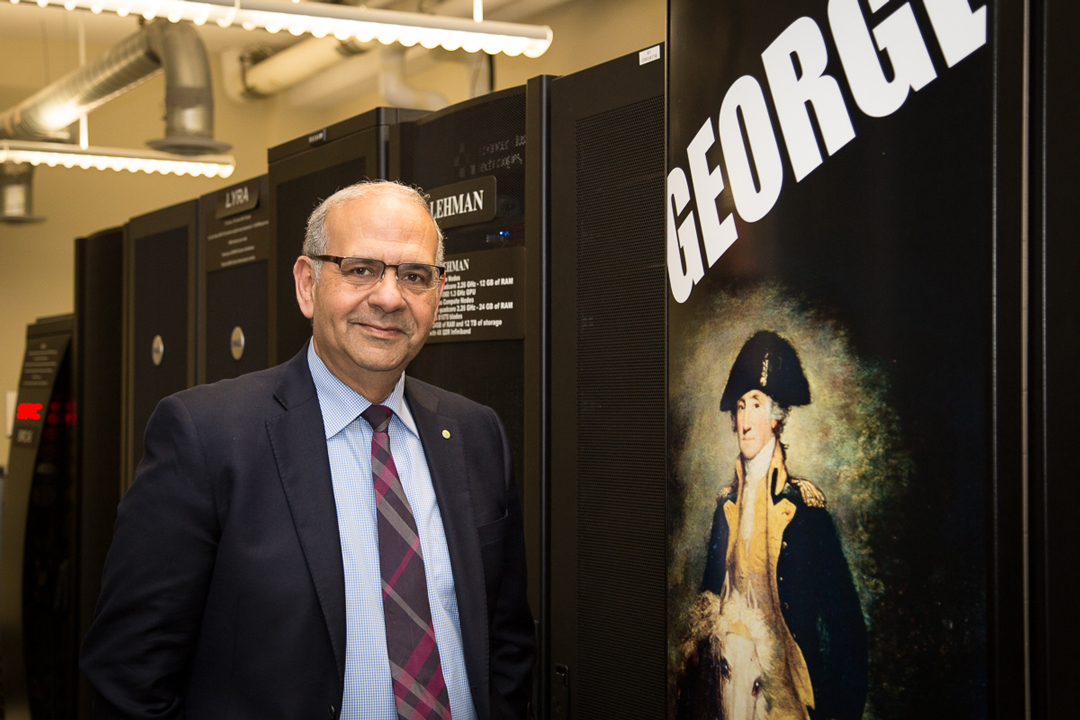Computer engineering professor and IEEE fellow Dr. Tarek El-Ghazawi is working to provide ways to make computer systems orders of magnitude faster, more energy efficient, and easier to use. He does so by investigating hardware that makes program execution more productive and by designing future processor chips based on new transformative concepts for tomorrow’s computing.
While some of his research projects are short-term with impacts that can be seen in a few years, several of his projects are visionary innovations that will not be available even five years from now due to their novelty.
His short-term research focuses on extreme-scale, high-performance computing systems that are pushing the performance levels toward the exascale level, performing at a million trillion calculations per second. This includes methods within hardware assistance for efficiently-performing large computations on such systems by application users. In addition, Dr. El-Ghazawi is looking at the convergence between high-performance computing, cloud computing, big data, and machine intelligence to support the development of a smarter world. Some of this work is funded by the NSF and more notably, Intel through the GW-Intel Parallel Computing Center (GW-IPCC), which is led by Dr. El-Ghazawi.
His long-term research vision is focused on creating new concepts regarding the bases for future processor designs that do not suffer from the same limitations placed on current processors. The traditional digital processor models rely on increased clocking speeds and number of transistors placed on the computer chips as denoted by Moore’s Law . However, this approach does not work anymore due to the significant increase in power consumption at high frequencies, which creates the need to design new transformative ideas for future processors that are more power-efficient. Therefore, Dr. El-Ghazawi’s research team is investigating new processor designs based on neuromorphic, analog, and quantum computing to name a few.
In order to achieve orders of magnitude benefits over the current state-of-the-art processors, Dr. El-Ghazawi is collaborating with professor Volker Sorger in developing nanophotonic innovations, where they put their expertise in computer architecture and high-performance Computing within nanophotonics, exploring behaviors of light on the nanometer scale, to engender new breeds of processors. They currently have a 4-year NSF project, working to design a nanophotonic, analog, reconfigurable, optical computer, also known as “ROC.” They also have another project co-funded by the NSF and the Semiconductor Research Corporation (SRC) in which they are building a nanophotonic, neuromorphic computer which is inspired by how the brain works. A third collaboration with the Air Force Office of Scientific Research(AFOSR) is focused on using nanophotonic connections for multi-processor chips, also known as multi-core architecture.
Professor El-Ghazawi has had a long history of working with government organizations on research projects of critical national interest in high-performance computing. He is one of the pioneers in the area of high-performance reconfigurable computing and has established in GW an NSF industry and university Center for High-Performance Reconfigurable Computing(CHREC), which was funded from 2006-2015. He was one of the early contributors to building supercomputers, known as clusters, from commodity computer parts. Along his former student, Major General Dr. Prachya Charlemwat of Thailand, they built the first computer cluster in GW in 1995. In the early 2000s, Dr. El-Ghazawi and his colleagues have co-authored one of the most important parallel programming languages called Unified Parallel C (UPC), which is a modified version of the C programming language for programming supercomputers.
He is currently the director of the Intel Parallel Computing Center (IPCC) at GW, focusing on advancing parallel programming for multi-core chips, including locality-aware optimizations and new programming paradigms such as PGAS for multi-core chips. Multi-core chips include the Xeon Phi or MIC (Many Integrated Core Architecture) such as the Knights Landing which has up to 72 processor cores, and can reach 3 TFLOPS (3 trillion calculations per second). They are used to build some of the top supercomputers in the world, as well as some powerful servers.
Dr. El-Ghazawi has been lecturing around the world on his topics of expertise, delivering keynote addresses and leading many international technical conferences within his capacity as an IEEE Computer Society Distinguished Visiting Program speaker and a UK Royal Academy of Engineering Distinguished Visiting Professor. His work is known worldwide and has earned him many special recognitions. He was selected an IEEE Fellow and Fulbright senior scholar, and was awarded the Humboldt Research Award, given to 100 scientists from across the world every year, the Alexander Schwarzkopf Prize for technical innovation, and the IEEE Outstanding Service Award.
Dr. El-Ghazawi has been interviewed by major media including the Washington Post, IEEE Spectrum, Sky News, Voice of America, El Nahar TV and Al Jazeerah.


